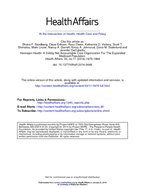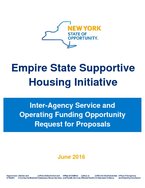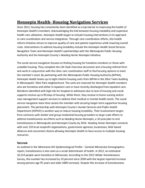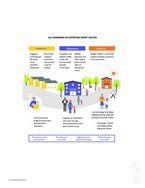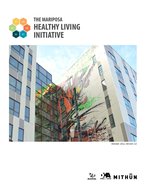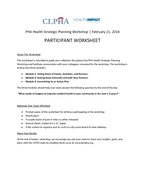0
Case study
Community:
Dec 11, 2018
As the Trump Administration continues to encourage states to take Medicaid coverage away from people who don’t meet a work requirement, a new report describes Montana’s promising alternative: a workforce promotion program that targets state resources toward reducing barriers to work.
Authored by: Hannah Katch for Center on Budget and Policy Priorities
Topics: Affordable Care Act, Asset building, Health, Legislation & Policy, Low-income, Medicaid / Medicare, Partnerships, Research, Workforce development
 Shared by Housing Is
Shared by Housing Is
Housing Is posted a
on Dec 11, 2018
Hannah Katch for Center on Budget and Policy Priorities
As the Trump Administration continues to encourage states to take Medicaid coverage away from people who don’t meet a work requirement, a new report describes Montana’s promising alternative: a workforce promotion program that targets state resources toward reducing barriers to work.
0
Webinar
Community:
Oct 15, 2018
Each year, the National Summer Learning Association (NSLA) recognizes the outstanding work done during the summer months on behalf of our nation’s youth. NSLA held a Summer Learning Awards Kick-off Webinar to discuss the 2019 application and answer any questions you might have about the process. We were joined by Lauren Kellner Rudolph, Managing Program Director of Breakthrough Miami, and winner of a 2018 Excellence in Summer Learning Award.
Authored by: National Summer Learning Association
Topics: Education, Low-income, Out-of-school time, Place-based, Youth
 Shared by Mica O'Brien
Shared by Mica O'Brien
Mica O'Brien posted a
on Nov 29, 2018
National Summer Learning Association
Each year, the National Summer Learning Association (NSLA) recognizes the outstanding work done during the summer months on behalf of our nation’s youth. NSLA held a Summer Learning Awards Kick-off Webinar to discuss the 2019 application and answer any questions you might have about the process.
0
Webinar
Community:
Jul 13, 2017
For providers in the Supportive Housing arena, it is no secret that the road to recovery begins with housing. However, this fact has not always been recognized by major healthcare entities, like Medicaid. Thankfully, this mindset is changing and Supportive Housing organizations now have the ability to cover many of their services via Medicaid. Since the rules and requirements vary tremendously state-to-state, many providers feel overwhelmed with the documentation required to bill Medicaid.
During this session, Foothold Technology and experts from various states across the country, including Steve Coe, CEO of Community Access, Kevin Martone, Executive Director of the Technical Assistance Collaborative, and Lindsay Casale, Housing First Program Director, Pathways Vermont, discuss the ins and outs of Medicaid for Supportive Housing. You will walk away with knowledge on: best practices from agencies already receiving Medicaid dollars; what reporting requirements providers should be aware of and on the lookout for, and how these can vary state-to-state; and tips on documentation methods and why a solid electronic record is crucial for Medicaid reimbursement.
For more supportive housing resources, join our online community at:
http://shrc.footholdtechnology.com/
Authored by: Foothold Technology
Topics: Affordable Care Act, Dual-eligibles, Health, Low-income, Medicaid / Medicare, Supportive housing
 Shared by Mica O'Brien
Shared by Mica O'Brien
Mica O'Brien posted a
on Nov 14, 2018
For providers in the Supportive Housing arena, it is no secret that the road to recovery begins with housing. However, this fact has not always been recognized by major healthcare entities, like Medicaid.
0
Webinar
Community:
Nov 14, 2018
In the first session of this series, Foothold Technology Director of Client Services, Paul Rossi and Senior Advisor, David Bucciferro, along with Sue Augustus from CSH, bring us back to basics of all things Medicaid. They cover topics ranging in commonly used terms, coverage and eligibility and the differences between Medicaid and Medicare. This webinar series is designed for beginners and experts alike. Beginners will walk away with a strong foundation and experts will have the opportunity to contribute to the conversation.
Authored by: Foothold Technology and CSH
Topics: Affordable Care Act, Disabilities, Health, Low-income, Medicaid / Medicare
 Shared by Mica O'Brien
Shared by Mica O'Brien
Mica O'Brien posted a
on Nov 14, 2018
Foothold Technology and CSH
In the first session of this series, Foothold Technology Director of Client Services, Paul Rossi and Senior Advisor, David Bucciferro, along with Sue Augustus from CSH, bring us back to basics of all things Medicaid.
0
Case study
Community:
Oct 31, 2018
To encourage architects and planners to design built environments that promote physical activity, New York City offers an “active design” building incentive within the Leadership in Energy and Environmental Design (LEED) standards. The Centers for Disease Control and Prevention (CDC) recommends that adults ages 18 to 65 engage in 150 minutes of moderate-intensity physical activity (MPA) or 75 minutes of vigorous physical activity (VPA) per week to reduce risk of disease and promote a healthy lifestyle, but in 2011, only 20 percent of Americans met these goals. Active design interventions provide an easy way for residents to increase their activity and meet these goals. This study analyzed the impact of the new design incentive on the activity levels of affordable housing residents at the Arbor House, a 124-unit development in the South Bronx that received the LEED credit.
Authored by: How Housing Matters, Preventative Medicine Reports
Topics: East Coast, Exercise, Health, Housing, Low-income, Place-based, Preventative care, Research
 Shared by Mica O'Brien
Shared by Mica O'Brien
Mica O'Brien posted a
on Nov 1, 2018
How Housing Matters, Preventative Medicine Reports
To encourage architects and planners to design built environments that promote physical activity, New York City offers an “active design” building incentive within the Leadership in Energy and Environmental Design (LEED) standards.
0
Webinar
Community:
Aug 29, 2018
Half of public housing authorities (PHAs) are engaged in at least one health initiative, almost all in partnership with the health sector, according to a new report by the Council of Large Public Housing Authorities (CLPHA) and the Public and Affordable Housing Research Corporation (PAHRC).Health Starts at Home: A National Snapshot of Public Housing Authorities' Health Partnerships finds that PHAs are key players in addressing the intersection of housing and health and that deepening partnerships between PHAs and health providers can better serve residents' and communities’ health needs.
Stephen Lucas (CLPHA), Keely Stater (PAHRC), and Kelly McElwain (PAHRC) discuss health initiatives taking place at PHAs across the country and strategies for better serving communities with cross-sector partnerships.
Authored by: CLPHA
Topics: CLPHA, Dual-eligibles, Health, Housing, Low-income, Medicaid / Medicare, Mental health, Nutrition, Partnerships, Place-based, Preventative care, Research, Seniors
 Shared by Housing Is
Shared by Housing Is
Housing Is posted a
on Oct 11, 2018
Half of public housing authorities (PHAs) are engaged in at least one health initiative, almost all in partnership with the health sector, according to a new report by the Council of Large Public Housing Authorities (CLPHA) and the Public and Affordable Housing Research Corporation (PAHRC).Health St
0
Webinar
Community:
Oct 8, 2018
During this All In webinar, Caroline Fichtenberg of SIREN reviewed the current landscape of assessment tools and outcomes measures for social needs. Karis Grounds of 2-1-1 San Diego explained how they incorporated social needs assessment into their Risk Rating Scale, which helps them better serve clients while showing the impact of their services.
Authored by: All In: Data for Community Health
Topics: Data sharing, Health, Low-income, Metrics, Partnerships, West Coast
 Shared by Mica O'Brien
Shared by Mica O'Brien
Mica O'Brien posted a
on Oct 10, 2018
All In: Data for Community Health
During this All In webinar, Caroline Fichtenberg of SIREN reviewed the current landscape of assessment tools and outcomes measures for social needs.
0
Webinar
Community:
Oct 8, 2018
A growing recognition of the importance of social determinants of health (SDOH) has led to a proliferation of screening and assessment tools, but there are currently no national standards for how to systematically capture and address the non-health needs of patients. To provide some guidance for communities just starting out on this path, All In: Data for Community Health hosted a webinar featuring two subject matter experts.
Authored by: All In: Data for Community Health
Topics: Data sharing, Health, Metrics, Partnerships
 Shared by Mica O'Brien
Shared by Mica O'Brien
Mica O'Brien posted a
on Oct 10, 2018
All In: Data for Community Health
A growing recognition of the importance of social determinants of health (SDOH) has led to a proliferation of screening and assessment tools, but there are currently no national standards for how to systematically capture and address the non-health needs of patients.
0
Webinar
Community:
Oct 9, 2018
CLPHA’s Education Working Group hosts a webinar with Bright by Text, a texting platform that connects caregivers with tools for improving educational outcomes for children. Bright by Text’s President and Senior Program Manager share information about their partnerships with housing authorities and non-profit housing providers across the country, providing insight into the benefits of connecting with residents through technology. CLPHA members who work with Bright by Text outline their respective initiatives and discussed local program goals.
Authored by: CLPHA
Topics: Child welfare, CLPHA, Dual-generation, Early childhood, Family engagement, Health, Home visiting, Housing, Housing Is Working Group, Partnerships, Place-based, Preventative care, Safety, School-readiness
 Shared by Mica O'Brien
Shared by Mica O'Brien
Mica O'Brien posted a
on Oct 10, 2018
CLPHA’s Education Working Group hosts a webinar with Bright by Text, a texting platform that connects caregivers with tools for improving educational outcomes for children.
0
Case study
Community:
Sep 25, 2018
Practitioners working on community safety have increasingly incorporated creative placemaking techniques into their work. Creative placemaking refers to the ways in which arts and culture change how people use the places they share.
Authored by: Mark Treskon for Urban Institute
Topics: Community development, Criminal justice, Low-income, Out-of-school time, Partnerships, Place-based
 Shared by Mica O'Brien
Shared by Mica O'Brien
Mica O'Brien posted a
on Oct 10, 2018
Mark Treskon for Urban Institute
Practitioners working on community safety have increasingly incorporated creative placemaking techniques into their work. Creative placemaking refers to the ways in which arts and culture change how people use the places they share.
0
Webinar
Community:
Sep 26, 2018
The Colorado Coalition for the Homeless (CCH) has been investing in supportive housing since 1990. Since that time, this comprehensive community health center has developed nearly 1,700 units of housing, and is one of the country’s leaders in integrating health care and housing for a vulnerable population.
This webinar discusses how CCH finances its capital development; how they plan, design, and manage multiple projects simultaneously; how they integrate housing and health care services; and how they include property management staff in a coordinated approach to care. This conversation with members of CCH’s leadership complements our recent policy brief and included time for audience Q&A.
Authored by: National Health Care for the Homeless Council
Topics: Health, Homelessness, Low-income, Medicaid / Medicare, Mental health, Pacific Northwest, Place-based, Supportive housing
 Shared by Mica O'Brien
Shared by Mica O'Brien
Mica O'Brien posted a
on Oct 9, 2018
National Health Care for the Homeless Council
The Colorado Coalition for the Homeless (CCH) has been investing in supportive housing since 1990.
0
Case study
Community:
Jun 25, 2018
The King County Housing Authority (KCHA), in partnership with the Highline School District and the nonprofit social service organization Neighborhood House, launched the Student and Family Stability Initiative (SFSI) pilot program in 2013 to provide housing and employment supports to homeless and unstably housed families with children enrolled in Highline elementary schools. In 2016, KCHA contracted with the Urban Institute (Urban) to conduct a process and outcome evaluation of the program’s first three pilot years. This evaluation documents how SFSI works, who it serves, and how well it helps participants achieve housing stability. This report synthesizes findings from data collection conducted over approximately 10 months that included document review, interviews with SFSI stakeholders, and analysis of program and other relevant KCHA administrative data.
Authored by: Martha M. Galvez, Amanda Gold, and Sara McTarnaghan
Topics: Attendance, Dual-generation, Education, Family engagement, Housing, Low-income, Pacific Northwest, Partnerships, Place-based, Research, Stability, Workforce development, Youth
 Shared by Mica O'Brien
Shared by Mica O'Brien
Mica O'Brien posted a
on Sep 18, 2018
Martha M. Galvez, Amanda Gold, and Sara McTarnaghan
The King County Housing Authority (KCHA), in partnership with the Highline School District and the nonprofit social service organization Neighborhood House, launched the Student and Family Stability Initiative (SFSI) pilot program in 2013 to provide housing and employment supports to homeless and un
0
Case study
Community:
Aug 9, 2018
The Vita Health & Wellness District is a one-mile corridor in Stamford, Connecticut, that has positioned itself as a “health-themed neighborhood,” offering mixed-income housing, health care services, community farming, early childhood education programming, and supportive services to residents. Led by the city’s public housing authority Charter Oak Communities and Stamford Hospital, this collaboration of city agencies and community-based organizations has focused on building physical and social capacity in a distressed neighborhood, with an emphasis on leveraging collective investments to yield a positive impact on neighborhood health and well-being.
Authored by:
Topics: Community development, Education, Food insecurity, Funding, Health, Housing, Nutrition, Partnerships
 Shared by Housing Is
Shared by Housing Is
Housing Is posted a
on Aug 9, 2018
The Vita Health & Wellness District is a one-mile corridor in Stamford, Connecticut, that has positioned itself as a “health-themed neighborhood,” offering mixed-income housing, health care services, community farming, early childhood education programming, and supportive services to residents.
0
Case study
Community:
Aug 9, 2018
Health care payment and delivery models that challenge providers to be accountable for outcomes have fueled interest in community-level partnerships that address the behavioral, social, and economic determinants of health.We describe how Hennepin Health—a county-based safety-net accountable care organization in Minnesota—has forged such a partnership to redesign the health care workforce and improve the coordination of the physical, behavioral, social, and economic dimensions of care for an expanded community of Medicaid beneficiaries.
Authored by:
Topics: Affordable Care Act, Cost effectiveness, Health, Low-income, Medicaid / Medicare, Mental health, Metrics, Partnerships, Research
 Shared by Housing Is
Shared by Housing Is
Housing Is posted a
on Aug 9, 2018
Health care payment and delivery models that challenge providers to be accountable for outcomes have fueled interest in community-level partnerships that address the behavioral, social, and economic determinants of health.We describe how Hennepin Health—a county-based safety-net accountable care org
0
Case study
Community:
Jul 23, 2018
Time and again, taking a narrow view of health care has proven ineffective in producing meaningful change. Yet the current
thrust of health care reform remains firmly focused on traditional health care services. Reforms such as care coordination models and patient centered medical homes are necessary but insufficient for homeless populations with complex problems. Pairing such reforms with supportive housing is more likely to result in lasting health improvements and reduced costs.
Authored by:
Topics: Cost effectiveness, East Coast, Health, Homelessness, Housing, Legislation & Policy, Medicaid / Medicare, Place-based, Supportive housing
 Shared by Housing Is
Shared by Housing Is
Housing Is posted a
on Jul 23, 2018
Time and again, taking a narrow view of health care has proven ineffective in producing meaningful change. Yet the current
thrust of health care reform remains firmly focused on traditional health care services.
0
Case study
Community:
Jul 19, 2018
Acknowledging the link between housing instability and expensive health care utilization, Hennepin Health began to include housing interventions in its approach to care coordination and service integration. Through care coordination efforts, this health reform initiative strives to improve quality of care and patient experience while lowering overall costs. Interventions to address housing instability include the Hennepin Health Social Services Navigation Team and Hennepin Health’s partnerships with the Minneapolis Public Housing Authority and the Hennepin County’s Heading Home Hennepin initiative.
Authored by:
Topics: Health, Homelessness, Housing, Partnerships, Pre-natal, Research, Youth
 Shared by Housing Is
Shared by Housing Is
Housing Is posted a
on Jul 19, 2018
Acknowledging the link between housing instability and expensive health care utilization, Hennepin Health began to include housing interventions in its approach to care coordination and service integration.
0
Infographics
Community:
Jul 19, 2018
School readiness, school attendance, and summer learning
Authored by:
Topics: Attendance, Dual-generation, Early childhood, Education, Family engagement, Grade-level proficiency, Literacy, Out-of-school time, School-readiness
 Shared by Housing Is
Shared by Housing Is
Housing Is posted a
on Jul 19, 2018
School readiness, school attendance, and summer learning
0
Case study
Community:
Jul 17, 2018
The Mariposa Healthy Living Initiative began in 2009, when the Denver Housing Authority and its master planning team established physical, mental, and community health as a proxy to understand how redevelopment actions would change the quality of life for residents. The Initiative recognizes that the built environment is a determinant of health outcomes, which ultimately influence the quality and length of life for residents. The Initiative uses a responsive and rigorous approach to address environmental and social determinants of health, which include Healthy Housing, Environmental Stewardship, Sustainable and Safe Transportation, Social Cohesion, Public Infrastructure, and Healthy Economy. The Initiative framework is intended to be a living implementation tool for designers, developers, and practitioners.
Authored by:
Topics: Housing, Low-income, Partnerships, Place-based, Preventative care, Research, Safety, Transportation, West Coast
 Shared by Housing Is
Shared by Housing Is
Housing Is posted a
on Jul 17, 2018
The Mariposa Healthy Living Initiative began in 2009, when the Denver Housing Authority and its master planning team established physical, mental, and community health as a proxy to understand how redevelopment actions would change the quality of life for residents.
0
Case study
Community:
Jul 17, 2018
The South Lincoln Health Impact Assessment (HIA) focuses on the redevelopment master plan for the Denver Housing Authority’s South Lincoln Homes community in downtown Denver. The rapid HIA and masterplan was a four-month process that began in April 2009. The HIA identifies potential health impacts and recommends changes to optimize positive and minimize negative health consequences for the South Lincoln neighborhood. This assessment includes community demographic and socioeconomic information, identified potential health issues, interviews available surveys, and limited body measurement data along with supportive evidence-based research and recommendations that informed the HIA and masterplan design.
Authored by:
Topics: Child welfare, Community development, Disabilities, Dual-generation, Health, Housing, Low-income, Mental health, Metrics, Nutrition, Preventative care, Research, Safety
 Shared by Housing Is
Shared by Housing Is
Housing Is posted a
on Jul 17, 2018
The South Lincoln Health Impact Assessment (HIA) focuses on the redevelopment master plan for the Denver Housing Authority’s South Lincoln Homes community in downtown Denver. The rapid HIA and masterplan was a four-month process that began in April 2009.
0
Case study
Community:
Jul 13, 2018
The Conway Center is a project of a nonprofit housing and services organization, So Others Might Eat, and a federally qualified health center, Unity Health Care, in Washington, DC. This $90 million community development initiative will colocate employment training, health care services, and affordable housing under one roof in Ward 7, an area of DC experiencing high poverty and unemployment, and poor health outcomes. The partnership aims to improve access to affordable rental housing, increase livable-wage job attainment, and connect residents to high-quality health care services. Although still under construction, this partnership highlights how a shared vision among community-serving organizations and funders can result in a comprehensive strategy for improving resident health and well-being
Authored by:
Topics: Community development, Cost effectiveness, Food insecurity, Health, Housing, Low-income, Medicaid / Medicare, Partnerships, Place-based, Stability
 Shared by Housing Is
Shared by Housing Is
Housing Is posted a
on Jul 13, 2018
The Conway Center is a project of a nonprofit housing and services organization, So Others Might Eat, and a federally qualified health center, Unity Health Care, in Washington, DC.
0
Case study
Community:
Jul 12, 2018
The Trauma Informed Community Building (TICB) model is based on BRIDGE Housing Corporation’s experience doing community building work over the past five years in the Potrero Terrace and Annex public housing sites in San Francisco, CA.
Authored by:
Topics: Child welfare, Community development, Dual-generation, Family engagement, Low-income, Mental health, Partnerships, Place-based, Preventative care, Research, Safety
 Shared by Housing Is
Shared by Housing Is
Housing Is posted a
on Jul 12, 2018
The Trauma Informed Community Building (TICB) model is based on BRIDGE Housing Corporation’s experience doing community building work over the past five years in the Potrero Terrace and Annex public housing sites in San Francisco, CA.
0
Case study
Community:
Jul 12, 2018
In Boston, Massachusetts, the Boston Housing Authority, Boston Public Health Commission, the city’s Inspectional Services Department, the Boston Foundation, and local universities and medical institutions have come together over the last decade-plus to address the intersection of health and housing. Motivated by a desire to improve the lives of Boston’s most vulnerable residents, these organizations began collaborating to address asthma and, more recently, to prioritize housing and health needs for pregnant women. By bridging anchor institutions, foundations, and city agencies around health and housing initiatives citywide, Boston has made strides toward providing healthier housing options and integrated health management and referral systems. This case study highlights how a variety of key stakeholders within one city can collaborate to address the health and housing needs of its vulnerable residents.
Authored by:
Topics: Asthma, Child welfare, Dual-generation, Early childhood, East Coast, Exercise, Family engagement, Funding, Health, Home visiting, Homelessness, Housing, Low-income, Medicaid / Medicare, Nutrition, Obesity, Partnerships, Pre-natal, Preventative care, Research, Smoke-free
 Shared by Housing Is
Shared by Housing Is
Housing Is posted a
on Jul 12, 2018
In Boston, Massachusetts, the Boston Housing Authority, Boston Public Health Commission, the city’s Inspectional Services Department, the Boston Foundation, and local universities and medical institutions have come together over the last decade-plus to address the intersection of health and housing.
0
Case study
Community:
Jul 10, 2018
Reducing Pediatric Asthma through Home Improvements and Education
Authored by:
Topics: Asthma, Child welfare, Community development, Cost effectiveness, Data sharing, Early childhood, Education, Family engagement, Health, Healthy homes, Housing, Low-income, Medicaid / Medicare, Metrics, Partnerships, Place-based, Preventative care, Research, Safety
 Shared by Housing Is
Shared by Housing Is
Housing Is posted a
on Jul 10, 2018
Reducing Pediatric Asthma through Home Improvements and Education
0
Webinar
Community:
Feb 27, 2018
Worksheet from CLPHA's February 2018 Health Strategic Planning Workshop, co-facilitated with Health Impact Project and Grantmakers in Health
Authored by: CLPHA, and Health Impact Project (Pew/RWJF)
Topics:
 Shared by Steve Lucas
Shared by Steve Lucas
Steve Lucas posted a
on Feb 27, 2018
The 2018 CLPHA Health Strategic Planning Workshop, co-facilitated with Health Impact Project (a collaboration of Pew Charitable Trusts and Robert Wood Johnson Foundation) and Grantmakers in Health, convened over 35 communities across the country. Participating teams included internal PHA staff at member agencies who work on health-related initiatives as well as external partners that provide services, education, and other health resources for residents.
CLPHA, and Health Impact Project (Pew/RWJF)
Worksheet from CLPHA's February 2018 Health Strategic Planning Workshop, co-facilitated with Health Impact Project and Grantmakers in Health
0
Webinar
Community:
Feb 21, 2018
Presentation from CLPHA's February 2018 Health Strategic Planning Workshop, co-facilitated with Health Impact Project and Grantmakers in Health
Authored by: CLPHA, Health Impact Project (Pew/RWJF), and Grantmakers in Health
Topics: Affordable Care Act, CLPHA, Community development, Data sharing, Health, Healthy homes, Homelessness, Housing, Medicaid / Medicare, Mental health, Obesity, Partnerships, Place-based, Research, Supportive housing, TA
 Shared by Steve Lucas
Shared by Steve Lucas
Steve Lucas posted a
on Feb 27, 2018
The 2018 CLPHA Health Strategic Planning Workshop, co-facilitated with Health Impact Project (a collaboration of Pew Charitable Trusts and Robert Wood Johnson Foundation) and Grantmakers in Health, convened over 35 communities across the country. Participating teams included internal PHA staff at member agencies who work on health-related initiatives as well as external partners that provide services, education, and other health resources for residents.
CLPHA, Health Impact Project (Pew/RWJF), and Grantmakers in Health
Presentation from CLPHA's February 2018 Health Strategic Planning Workshop, co-facilitated with Health Impact Project and Grantmakers in Health
 Shared by Housing Is
on Dec 11, 2018
Shared by Housing Is
on Dec 11, 2018
 Shared by Housing Is
on Oct 11, 2018
Shared by Housing Is
on Oct 11, 2018


 Shared by Housing Is
on Aug 9, 2018
Shared by Housing Is
on Aug 9, 2018
 Shared by Housing Is
on Aug 9, 2018
Shared by Housing Is
on Aug 9, 2018
 Shared by Housing Is
on Jul 23, 2018
Shared by Housing Is
on Jul 23, 2018
 Shared by Housing Is
on Jul 19, 2018
Shared by Housing Is
on Jul 19, 2018
 Shared by Housing Is
on Jul 19, 2018
Shared by Housing Is
on Jul 19, 2018
 Shared by Housing Is
on Jul 17, 2018
Shared by Housing Is
on Jul 17, 2018
 Shared by Housing Is
on Jul 17, 2018
Shared by Housing Is
on Jul 17, 2018
 Shared by Housing Is
on Jul 13, 2018
Shared by Housing Is
on Jul 13, 2018
 Shared by Housing Is
on Jul 12, 2018
Shared by Housing Is
on Jul 12, 2018
 Shared by Housing Is
on Jul 12, 2018
Shared by Housing Is
on Jul 12, 2018
 Shared by Housing Is
on Jul 10, 2018
Shared by Housing Is
on Jul 10, 2018
 Shared by Steve Lucas
on Feb 27, 2018
Shared by Steve Lucas
on Feb 27, 2018
 Shared by Steve Lucas
on Feb 27, 2018
Shared by Steve Lucas
on Feb 27, 2018





